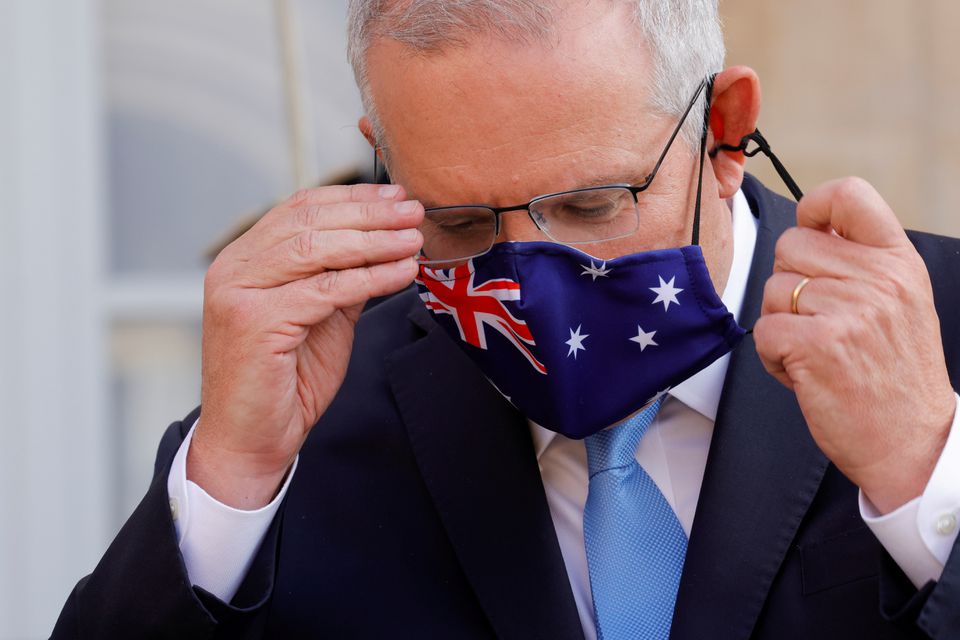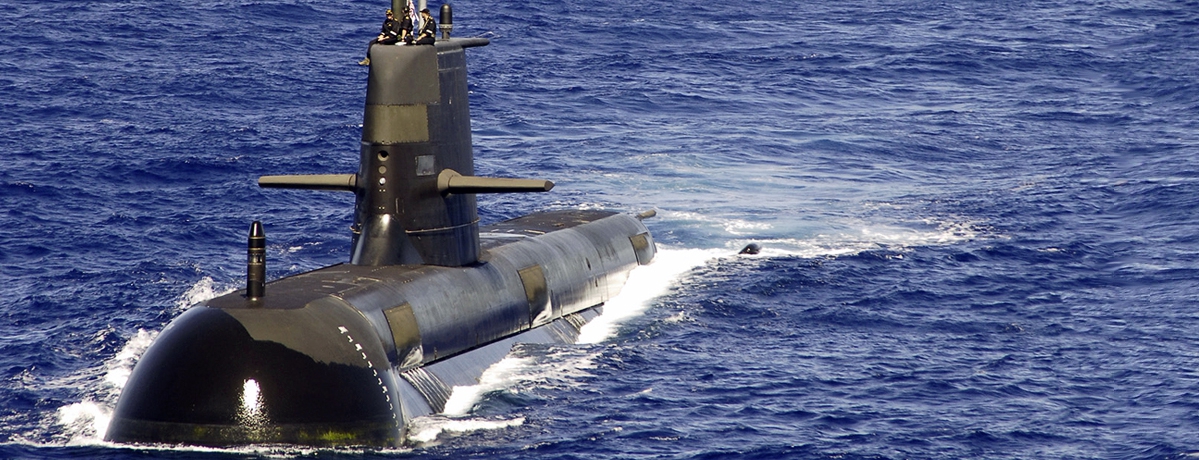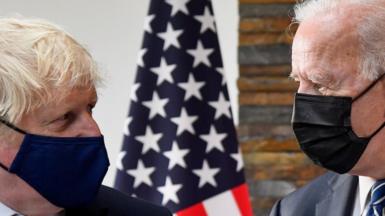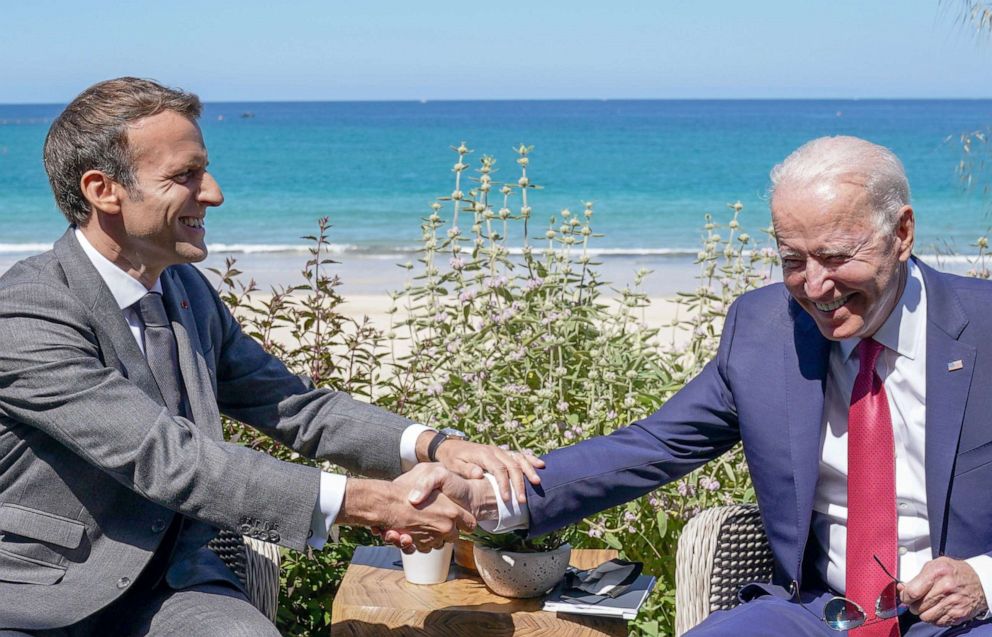www.aljazeerah.info
News, September 2020
Archives
Mission & Name
Conflict Terminology
Editorials
Gaza Holocaust
Gulf War
Isdood
Islam
News
News Photos
Opinion Editorials
US Foreign Policy (Dr. El-Najjar's Articles)
www.aljazeerah.info
|
Editorial Note: The following news reports are summaries from original sources. They may also include corrections of Arabic names and political terminology. Comments are in parentheses. |
Biden-Macron Phone Call Defused Tensions Over Australia Submarine Deal, Reaffirmed Commitment to US-EU Strategic Alliance, September 20, 2021
 |
 |
| Australian Prime Minister, Scott Morrison, during a news conference with French President, Emmanuel Macron, June 15, 2021 | Australian conventional submarine HMAS Rankin |
 |
 |
| British Prime Minister, Boris Johnson and US President Joe Biden, June 14, 2021 | France's President, Emmanuel Macron (L), and US President Joe Biden before a meeting of the G-7 summit, in Cornwall, England, on June 12, 2021 |
Joint Statement on the Phone Call between President Biden and President Macron
White House, September 22, 2021
President Emmanuel Macron of the French Republic and President Joe
Biden of the United States of America spoke on September 22, at the
request of the latter, in order to discuss the implications of the
announcement on September 15. The two leaders agreed that the situation
would have benefited from open consultations among allies on matters of
strategic interest to France and our European partners. President Biden
conveyed his ongoing commitment in that regard.
The two leaders
have decided to open a process of in-depth consultations, aimed at
creating the conditions for ensuring confidence and proposing concrete
measures toward common objectives. They will meet in Europe at the end
of October in order to reach shared understandings and maintain momentum
in this process. President Emmanuel Macron has decided that the French
Ambassador will return to Washington next week. He will then start
intensive work with senior US officials.
President Biden
reaffirms the strategic importance of
French and European engagement in the Indo-Pacific region,
including in the framework of the European Union’s recently published
strategy for the Indo-Pacific. The United States also recognizes the
importance of a stronger and more capable European defense, that
contributes positively to transatlantic and global security and is
complementary to NATO.
In the framework of their joint fight against terrorism, the United
States commits to reinforcing its support to counter-terrorism
operations in the Sahel
conducted by European states.
Joint Statement on the Phone Call between President Biden and President Macron | The White House
***
Biden Seeks Talks with Macron Amid Tensions Over Australia Submarine Deal, France Pulls out of UK Defense Talks
Biden seeks talks with Macron amid tensions over Australia submarine deal
France24, AFP, September 19, 2021
The United States and Britain sought Sunday to smooth tensions with Paris over a new security pact with Australia, with US President Joe Biden requesting early talks with his French counterpart Emmanuel Macron.
The announcement of the defence alliance, and Australia’s related decision to tear up a deal to buy French submarines in favour of American nuclear-powered vessels, sparked outrage in Paris, with Macron recalling France’s ambassadors to Canberra and Washington in an unprecedented move.
But on Sunday British Prime Minister Boris Johnson tried to downplay France’s concerns about the deal, saying the pact was “not meant to be exclusionary... it’s not something that anybody needs to worry about and particularly not our French friends”.
Biden has requested a phone call with Macron, French government spokesman Gabriel Attal said, which would happen “in the coming days”.
“We want explanations,” Attal said, adding that the US had to answer for “what looks a lot like a major breach of trust”.
The recall of the ambassadors to Australia and the US—for the first time in the history of relations with the countries—was “to show how unhappy we are and that there is a serious crisis between us”, French Foreign Minister Jean-Yves Le Drian said Saturday.
“There has been lying, duplicity, a major breach of trust and contempt,” Le Drian told France 2 television.
‘Grave concerns’
Australian Prime Minister Scott Morrison on Sunday rejected the accusation that Canberra had lied, saying he had raised concerns over the now-scuppered subs deal “some months ago”.
“I think they would have had every reason to know that we had deep and grave concerns,” he told reporters in Sydney. “We made very clear that we would be making a decision based on our strategic national interest.”
Australia defends scrapping of French submarine deal as ambassador heads home 01:22
The French contract to supply conventional submarines to Australia was worth Aus$50 billion ($36.5 billion, 31 billion euros) when signed in 2016.
Morrison said he understood France’s disappointment, but added: “I don’t regret the decision to put Australia’s national interest first. Never will.”
Defence Minister Peter Dutton also insisted Canberra had been “upfront, open and honest” with Paris about its concerns—a claim quickly rejected by French Defence Minister Florence Parly.
“His statement is inaccurate,” she said during a visit to Niger. “We were never informed of Australia’s intentions.”
‘Ineradicable love’
En route to New York on Sunday, Johnson told reporters that Britain and France have a “very friendly relationship”, which he described as being of “huge importance”.
“Our love of France is ineradicable,” he said.
But although France has not recalled its ambassador to Britain, Le Drian’s explanation for why was stinging.
“There is no need. We know their constant opportunism. So there is no need to bring our ambassador back to explain,” he said in the France 2 interview.
Of London’s role in the pact, he said: “Britain in this whole thing is a bit like the third wheel.”
A source at France’s defence ministry said Paris had cancelled a meeting set for this week between Parly and her British counterpart Ben Wallace.
In London, a Ministry of Defence source said they could neither confirm nor deny the cancellation.
‘Nuclear arms race’
Biden announced the new Australia-US-Britain defence alliance, widely seen as aimed at countering the rise of China, on Wednesday.
It extends American nuclear submarine technology to Australia, as well as cyber-defence, applied artificial intelligence and undersea capabilities.
North Korea on Monday warned the deal could trigger a “nuclear arms race” in the region.
“These are extremely undesirable and dangerous acts which will upset the strategic balance in the Asia-Pacific region and trigger off a chain of nuclear arms race,” state media KCNA quoted a foreign ministry official as saying.
China has also reacted angrily, describing the deal as an “extremely irresponsible” threat, and warning the Western allies they risked “shooting themselves in the foot”.
Paris’ fury at what it sees as a “stab in the back” threatens long-term diplomatic repercussions.
Le Drian said NATO would have to take account of what has happened as it reconsiders strategy at a summit in Madrid next year.
France would now prioritise developing an EU security strategy when it takes over the bloc’s presidency at the start of 2022, he added.
French European Affairs Minister Clement Beaune has hinted that the row could affect Australia’s chances of making progress towards a trade pact with the EU, its third-biggest trading partner.
Biden seeks talks with Macron amid tensions over Australia submarine deal (france24.com)
***
US to provide Australia with nuclear submarines to blunt Chinese
Robert Besser
The Australian Herald, 19 Sep 2021, 14:04 GMT
U.S. President Joe Biden, U.K. Prime Minister Boris Johnson, and Australian Prime Minister Scott Morrison, have announced that Australia will adapt nuclear propulsion systems to its submarines.
Johnson said the agreement will make the world safer, calling it a momentous decision for Australia.
The three leaders did not mention China, and senior Biden administration officials told reporters the partnership is not intended to counter Beijing's influence.
WASHINGTON, D.C.:
U.S. President Joe Biden, U.K. Prime Minister Boris Johnson and
Australian Prime Minister Scott Morrison have announced that Australia
will adapt nuclear propulsion systems to its submarines, but will not
develop nuclear weapons.
"We all recognize the need to ensure
peace and stability in the Indo-Pacific over the long-term," Biden said.
The submarines will be built in Adelaide, South Australia, in close
cooperation with the U.S. and Britain, Morrison said, adding, "We will
continue to meet all our nuclear non-proliferation obligations."
Johnson said the agreement will make the world safer, calling it a
momentous decision for Australia.
The three leaders did not
mention China, and senior Biden administration officials told reporters
the partnership is not intended to counter Beijing's influence.
The governments will now begin an 18-month consultation period "to
determine every element of the agreement," Biden added.
In
response, the Chinese Embassy in the U.S. said countries should not form
exclusionary blocs targeting or harming the interests of third parties.
As Australia's economy depends upon China, this is a bold move, said
James Clapper a former director of U.S. national intelligence, speaking
to CNN, adding, "Clearly, the Chinese will view this as provocative."
A spokesperson for Morrison told Reuters that the new partnership
will result in canceling Australia's 2016 deal with French shipbuilder
Naval Group to build a new fleet of 12 diesel submarines worth $40
billion.
In response, the French said Australia's decision was a
major disappointment, and French Foreign Minister Jean-Yves Le Drian
stressed that the actions of the U.S. highlighted a lack of coordination
when the two allies are facing common challenges in the Indo-Pacific
region.
U.S. defense companies and other firms, such as General
Dynamics and Huntington Ingalls Industries, are expected to profit from
the submarine agreement.
The announcement of the pact came barely
one week before Biden is scheduled to host the first in-person meeting
of the leaders of Australia, India, Japan and the U.S., collectively
known as the "Quad" group, aimed at countering China's influence.
US to provide Australia with nuclear submarines to blunt Chinese (australianherald.com)
Aukus: France pulls out of UK defence talks amid row
By Alex Therrien
BBC News, September 20, 2021France's defence minister has cancelled talks with her UK counterpart amid the row prompted by a new security deal between Britain, the US and Australia.
Paris is angry after Australia signed the Aukus pact to build nuclear-powered submarines, pulling out of a major contract with France in the process.
UK PM Boris Johnson said France had nothing to worry about from the deal.
But Florence Parly's meeting with UK Defence Secretary Ben Wallace in London this week has been called off.
Lord Ricketts, a former British ambassador to France who was due to co-chair the two days of talks, confirmed the meeting had been "postponed to a later date".
'Very friendly relationship'
Foreign Office minister James Cleverly told BBC Breakfast that "all bilateral relationships go through periods of tension", but added: "I have absolutely no doubt that ultimately our relationship with France will endure."
He said the pact with Australia and the US was intended to "strengthen and deepen" the relationship with two long-standing defence partners and to support high-tech manufacturing and technology companies across the UK.
The Aukus agreement brokered last week, widely seen as an effort to counter China's influence in the contested South China Sea, ended a deal worth $37bn (£27bn) signed by Australia in 2016 for France to build 12 conventional submarines.
French foreign minister Jean-Yves Le Drian has described it as a "stab in the back" that constitutes "unacceptable behaviour between allies and partners".
And in a virtually unprecedented step among allies, French President Emmanuel Macron ordered the recall of the French ambassadors to Washington and Canberra.
The European Union has said it was "analysing" the impact of the Aukus agreement on its trade negotiations with Australia, which are due to resume in October.
BBC Brussels correspondent Jessica Parker said it appeared the EU had hardened up its position over the weekend, as the extent of France's anger became clear.
She said the commission wouldn't elaborate on what "analysing" the impact of Aukus could actually mean for the trade talks with Australia - but the language might lead to speculation that negotiations could even be suspended.
Speaking on a flight to New York, where he will take part in the UN General Assembly, Mr Johnson said France should not "worry" about the alliance, insisting that Anglo-French relations were "ineradicable".
The prime minister said Britain and France had a "very friendly relationship", which he described as being of "huge importance".
"Our love of France is ineradicable," he told reporters.
"Aukus is not in any way meant to be zero-sum, it's not meant to be exclusionary. It's not something that anybody needs to worry about and particularly not our French friends."
Mr. Johnson is being joined on the trip with new Foreign Secretary Liz Truss, who launched her own defence of the agreement in an article for the Sunday Telegraph.
Ms. Truss said the deal showed the UK's readiness to be "hard-headed" in defending its interests and had the potential to create hundreds of new skilled jobs.
Meanwhile, Australia has defended scrapping its deal with France in favour of the Aukus pact.
Prime Minister Scott Morrison rejected accusations that Australia had lied, saying France should have been aware it was prepared to break the deal.
Speaking on Sunday, Mr Morrison said: "Ultimately, this was a decision about whether the submarines that were being built, at great cost to the Australian taxpayer, were going to be able to do a job that we needed it to do when they went into service and our strategic judgement based on the best possible of intelligence and defence advice was that it would not."
The agreement means Australia will become just the seventh nation in the world to operate nuclear-powered submarines.
The pact will also see the allies share cyber capabilities, artificial intelligence and other undersea technologies.
But it has been criticised by China, which has accused the three powers of having a "Cold War mentality".
And on Monday, North Korea, which has its own closely-watched nuclear weapon and missile programmes, warned it could spark a "nuclear arms race".
"These are extremely undesirable and dangerous acts which will upset the strategic balance in the Asia-Pacific region," state media KCNA quoted a foreign ministry official as saying.
Aukus: France pulls out of UK defence talks amid row - BBC News
***
Aukus pact delivers France some hard truths
By Hugh Schofield
BBC News, Paris, September 19, 2021
When they have picked themselves up from their humiliation, the French will need to gather their sangfroid and confront some cruel verities.
Number one: there is no sentiment in geostrategy.
The French must see there is no point in wailing about having been shoddily treated. They were.
But who ever heard of a nation short-changing its defence priorities out of not wanting to give offence? The fact is that the Australians calculated they had underestimated the Chinese threat and so needed to boost their level of deterrence.
They acted with steely disregard for French concerns but, when it comes to the crunch, that is what nations do. It is almost the definition of a nation: a group of people who have come together to defend their own interests. Their own, not others'.
Of course, sometimes nations decide their interests are best served by joining alliances. That's what the US did in suppressing its isolationist instincts in the last century.
But the second painful truth exposed by the Aukus affair is that the US no longer has any great interest in the outdated behemoth that is NATO. Nor does it harbour any particular loyalty to those who have stood by its side.
Gaullists in France - and President Emmanuel Macron is one of them - dream of their country as a fully independent power, exercising its force for good thanks to a global presence and nuclear-backed military strength. In practice, and not without considerable reserve, France has bound itself to the US-led alliance because that seemed both moral and expedient.
But now the questions echo around Paris: Why did we bother? What was in it for us?
"This blow came completely out of the blue," says Renaud Girard, senior foreign affairs analyst at Le Figaro newspaper.
"Macron made so much effort to help the Anglo-Saxons. With the Americans in Afghanistan; with the British on military co-operation; with the Australians in the Indo-Pacific. Look, he kept saying, we're following you - we are genuine allies.
"And he made the effort not just with Biden - but with Trump too! All that, and then this. No reward at all. Treated like dogs."
The French will now be re-evaluating their role in Nato. Their military participation in the organisation was suspended by De Gaulle in 1966 and only restored by Nicolas Sarkozy in 2009. There is no talk, yet, of a second withdrawal. But remember, Emmanuel Macron is the man who described Nato two years ago as "brain-dead". He will not have changed his mind.
But the third harsh truth is that there is no obvious other way for France to fulfillAukus pact delivers France some hard truths - BBC News its global ambitions.
The lesson of the last week is that France by itself is too small to make much of a dent in strategic affairs. Every four years the Chinese build as many ships as there are in the entire French fleet. When it came to the crunch, the Australians preferred to be close to a superpower, not a minipower.
The conventional way out of the conundrum has been for the French to say their military future lies in Europe. The EU - with its vast population and technological resources - would be the springboard for France's global mission.
But 30 years has given nothing beyond a few joint brigades, a bit of procurement planning and minor contingents from Estonia and the Czech Republic in Mali. For Renaud Girard, the idea of the EU as a military force is a "complete joke".
So what can France do?
Accept realities. Try to form ad hoc alliances (like Macron was indeed trying to do in the Indo-Pacific). Keep pushing the Germans to get over their 20th Century complexes and act like the power they really are.
And keep open a doorway to the British. It may not be the easiest of suggestions at the moment. Relations between Paris and London are at their worst level for many years. The French find it hard to conceal their contempt for Boris Johnson, and many in London appear to feel the same way back.
In the short term, it is quite possible that France will seek to punish the UK for its role in the Aukus affair, says Girard, possibly by scaling back the secret nuclear co-operation that forms part of the 2010 Lancaster Accords. There could be fall-out in other areas too, like the control of cross-Channel migrants.
But the UK's is Europe's only other serious army. The two countries have similar histories and world experiences. Their soldiers respect each other. In the long term, Franco-British defence co-operation is too logical to ignore. That may be the last of Macron's painful truths.
Aukus pact delivers France some hard truths - BBC News
***
Australian PM departs for Quad meeting amid French submarine deal fallout
By Colin Packham
September 20, 20212:51 AM
CANBERRA, Sept 20 (Reuters) -
Australian Prime Minister Scott Morrison on Monday departed for Washington to meet with leaders of the Quad grouping amid criticism over his government's decision to abandon a $40 billion submarine deal with France.
Australia last week said it would scrap a deal with France's Naval Group to build a fleet of conventional submarines and would instead build at least eight nuclear-powered submarines with U.S. and British technology after striking a trilateral security partnership. read more
France has said the relationship with Australia and the United States is in "crisis" and has recalled its ambassadors from both countries.
While Australia has moved to dampen tensions, expressing its regret over the incident, Morrison's meeting with fellow Quad leaders British Prime Minister Boris Johnson and U.S. President Joe Biden threatens to inflame French irritation.
"The French are very unimpressed and the sight of Morrison, Biden and Johnson together will do little to repair ties," said Haydon Manning, a political science professor at Flinders University in South Australia.
Japanese Prime Minister Yoshihide Suga will also attend the leaders’ meeting of the Quad group later this week.
Australian Prime Minister Scott Morrison adjusts his mask during a news conference he holds with French President Emmanuel Macron in front of the Elysee Palace in Paris, France, June 15, 2021. REUTERS/Pascal Rossignol/File Photo
The Quad will discuss COVID-19, climate change and regional security, two sources familiar with the schedule told Reuters.
"This is all about ensuring that Australia's sovereign interests will be put first to ensure that Australians here can live peacefully with the many others in our region," Morrison told reporters in Sydney as he boarded the plane to Washington.
Sponsored by Advertising Partner Sponsored Video Watch to learn more
New agreements furthering cooperation between the four countries are expected, but Australia will not announce strengthened climate targets sought by the United States, one senior government source said.
Morrison has rejected setting a target of net zero emissions by 2050 and is under pressure to do more ahead of a United Nations climate summit in Glasgow from Oct. 31 to Nov. 12.
Morrison is also facing growing pressure at home following the resignation of Christian Porter as minister for innovation and science after he accepted an anonymous donation to partially fund his fees when he launched defamation action against Australia's public broadcaster.
Morrison had sought advice on whether the donation - which stoked concerns about donor could seek outsized sway over the minister - could breach ministerial rules, but Porter on Sunday resigned.
Morrison must return to the polls by May 2022 and a widely watched poll on Monday showed the opposition centre-left Labor party on course to win power for the first time since 2013.
Reporting by Colin Packham; Editing by Michael Perry
Australian PM departs for Quad meeting amid French submarine deal fallout | Reuters
***
***
Share the link of this article with your facebook friendsFair Use Notice
This site contains copyrighted material the
use of which has not always been specifically authorized by the copyright
owner. We are making such material available in our efforts to advance
understanding of environmental, political, human rights, economic,
democracy, scientific, and social justice issues, etc. We believe this
constitutes a 'fair use' of any such copyrighted material as provided for
in section 107 of the US Copyright Law. In accordance with Title 17 U.S.C.
Section 107, the material on this site is
distributed without profit to those
who have expressed a prior interest in receiving the included information
for research and educational purposes. For more information go to: http://www.law.cornell.edu/uscode/17/107.shtml.
If you wish to use copyrighted material from this site for purposes of
your own that go beyond 'fair use', you must obtain permission from the
copyright owner.
|
|
|
|
||
|
||||||


